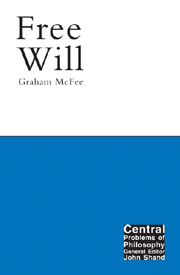Book contents
- Frontmatter
- Contents
- Preface and acknowledgements
- 1 Free will: the issue
- 2 Determinism: exposition
- 3 Determinism: qualifications and clarifications
- 4 Libertarianism: two varieties
- 5 Compatibilism I: the “utilitarian” position
- 6 Compatibilism II: the two-language view
- 7 The irrelevance of determinism
- 8 The very idea of causal necessity
- 9 Conclusions and reflections on philosophical method
- Appendix: chaos theory and determinism
- Notes
- A guide to further reading
- Bibliography
- Index
5 - Compatibilism I: the “utilitarian” position
- Frontmatter
- Contents
- Preface and acknowledgements
- 1 Free will: the issue
- 2 Determinism: exposition
- 3 Determinism: qualifications and clarifications
- 4 Libertarianism: two varieties
- 5 Compatibilism I: the “utilitarian” position
- 6 Compatibilism II: the two-language view
- 7 The irrelevance of determinism
- 8 The very idea of causal necessity
- 9 Conclusions and reflections on philosophical method
- Appendix: chaos theory and determinism
- Notes
- A guide to further reading
- Bibliography
- Index
Summary
Introduction
We concluded, in the previous chapter, that discussions of free will must begin from an acceptance of the thesis that every event has a cause; moreover, that the kinds of causes under discussion are those characterized by biophysics (from Chapter 3). Thus opponents of determinism are obliged to accept premise 1 of the determinist argument: every event does have a cause. What mileage, therefore, is there for the free will defender in denying premise 2 of that argument; that is, denying that actions are a kind of event? In the literature, there are two standard ways to articulate such a denial, both sometimes called “compatibilism”, since causation is thought compatible with free action. The most usual (which I call the “two-language view”) is considered in Chapter 6. Another attempt to, as it were, circumvent the determinist position has no established name in the literature: I shall call it “the utilitarian position”. That title is justified since (as with utilitarianism in moral philosophy) the emphasis is on the consequences of actions. This position had, at one time, a number of adherents. At its heart, it amounts to affirming the position of Dr Johnson: “Sir, we know our will is free, and there's an end on't” (quoted in Ayer 1954: 271).
Exposition of the utilitarian position
Of course, Johnson's blunt denial of the determinist conclusion cuts little ice with determinists, or even with those puzzled by the nature of free will. What is needed here is an articulated position endorsing free will and explaining how the determinist argument is to be combated.
- Type
- Chapter
- Information
- Free Will , pp. 69 - 78Publisher: Acumen PublishingPrint publication year: 2000

